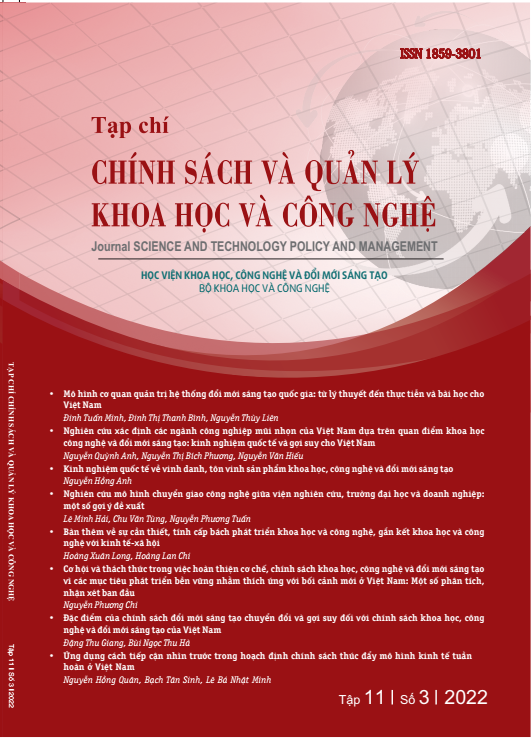Phát triển tổ chức khoa học công nghệ công lập theo định hướng tổ chức học tập
Từ khóa:
Tổ chức khoa học và công nghệ, Học tập của tổ chứcTóm tắt
Học tập của tổ chức là chủ đề thu hút sự quan tâm của rất nhiều nhà nghiên cứu và nhà quản lý trong các tổ chức. Rất nhiều câu hỏi về chủ đề này đã được đặt ra như: tổ chức có thể học tập hay không? tổ chức sẽ học tập như thế nào? mối liên hệ với việc học tập của cá nhân trong tổ chức như thế nào? Trong thời gian qua, nhiều trường phái lý thuyết liên quan đã được công bố để làm rõ bản chất việc học tập của tổ chức. Nghiên cứu này được thực hiện nhằm làm rõ bản chất quá trình học tập của tổ chức và tiến hành phân tích mô hình tổ chức học tập trong các tổ chức KH&CN điển hình của các trường đại học ở Việt Nam. Trên cơ sở đó đưa ra những khuyến nghị trong việc phát triển tổ chức KH&CN theo định hướng tổ chức học tập nhằm phát huy tối đa nguồn lực tri thức để tạo ra lợi thế cạnh tranh vượt trội dựa trên kết quả học tập của tổ chức.
Mã số: 23021301
Tải xuống
Tài liệu tham khảo
Amabile, TM., S.G. Barsade, J.S. Mueller, B.M. Staw, (2005). “Affect and creativity at work Admin”. Sci. Quart. 50, pp. 367-403.
Argote, Linda, and Ella Miron-Spektor, 2011. “Organizational learning: From experience to knowledge”, Organization Science 22.5 (2011): 1123-1137.
Argyris, C. and Schõn, D.A. (1978). Organizational Learning: A Theory of Action Perspective, MA: Addition-Wesley.
Bapuji, H., and Crossan, M. (2004). “From question to answers: reviewing organizational learning research”, Management Learning, 35 (4), pp. 397-417.
Bauman, G. L. (2005). “Promoting Organizational Learning in Higher Education to Achieve Equity in Educational Outcomes”, New Directions for higher Education, 131, 23-35.
Clark, B.R. (1983). The Higher Education System Berkeley: The University of California Press.
Collinson, V., and Cook, T. F. (2006). Organizational Learning: Improving Learning, Teaching, and Leading in School Systems: Improving Learning, Teaching, and Leading in School Systems. Sage Publications.
Daft, R. L and K. E. Weick, (1984). “Toward a model of organizations as an interpretation system”, Academy of Management Review, 9, 284-295.
De Holan, P.M., Philips, N, (2004). “Remembrance of things past: The dynamics of organizational forgetting”, Man Sci, 50(1), pp. 1603-1613.
Dill, D. (1999). “Academic accountability and university adaptation: The architecture of an academic learning organization”, Higher Education, 38, 127-139.
Drew, S. A. W. and Smith, P. A. C. (1995). “The learning organisation: change proofing and strategy”, The Learning Organisation 2(1), pp. 4-14.
Ewell, P. T (1997). “Organizing for Learning: A New Imperative”. AAHE Bulletin, pp. 3–6.
Fiol, C. M., M.A. Lyles, (1985). “Organizational learning”, Academy Management Review, 10, 803-813.
Fong, C. T, (2006). “The effects of emotional ambivalence on creativity”, Acad. Management J. 49, pp. 1016-1030.
Hedberg, B, (1981). “How Organizations Learn and Unlearn”, in P Nystrom & WH Starbuck (eds.), Handbook of Organizational Design (Vol.1), Cambridge University Press, London.
Huber, G. P, (1991). “Organizational learning: The contributing processes and the literatures”, Organizational Science, 2: 88-115
Johnes, J. and Taylor, J. (1990). Performance Indicators in Higher Education: Buckingham, The Society for Research into Higher Education & Open University, Buckingham
Luật Khoa học và Công nghệ số: 29/2013/QH13 ngày 18 tháng 6 năm 2013.
Lyles, M. (1992). “The impact of organisational learning on joint venture formations”, the Academy of Management Meetings, Las Vegas, Nevada
Nonaka, I. and Hirotaka, T. (1995). The Knowledge-Creating Company: How Japanese Companies Create the Dynamics of Innovation, Oxford University Press.
Trần Quang Huy và Phạm Thị Bích Ngọc (2016). Organizational learning in Higer education institutions: A casestudy in a public university in Vietnam. Journal of Economics and Development. Vol 18, No2, August 2016, p88-104
Trần Quang Huy (2018). Học hỏi của tổ chức trong các trường đại học ở Việt Nam. Hà Nội: Nhà xuất bản giáo dục Việt Nam.
Weick, K. and Roberts, K. (1993). “Collective mind in organisations: heedful interrelating on flight decks”, Administrative Science Quarterly, 38(3) pp. 357-381.
Tải xuống
Đã Xuất bản
Cách trích dẫn
Số
Chuyên mục
Giấy phép
Các bài viết (bao gồm cả phần Tóm tắt) ....

